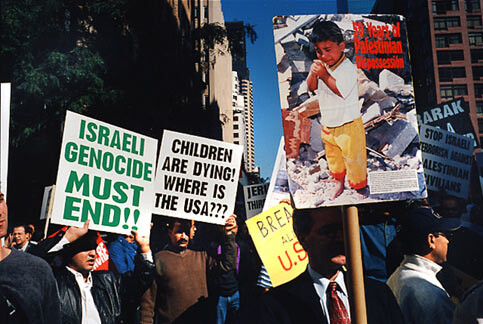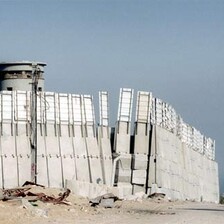The Electronic Intifada 30 October 2003

Pro-Palestinian demonstration in New York City. (Henry Leutwyler)
It is astonishing how little the Palestinian leadership learns from its past mistakes. The so-called “Geneva Accord” — an unofficial document agreed upon by former Israeli officials and Palestinians linked with the Palestinian Authority — is a new blunder that will do enormous harm to the Palestinian position, while doing nothing to extricate the Palestinian leadership from its sinking state.
The contents of the accord contradict fundamental Palestinian rights. The document envisages Israel keeping much of the land it has illegally colonised, especially around Jerusalem, and cancels the inalienable rights of Palestinian refugees.
It should be recalled that the Palestinians repeatedly committed themselves to peace with Israel. Before any negotiations even started, they agreed to settle for a state in just 22 per cent of historic Palestine, relinquishing the 78 per cent from which nearly a million Palestinians were forcibly expelled in 1947-48, when Israel was established on the ruins of the Palestinian nation. This decision has repeatedly been endorsed and backed by individual Arab states, and by the Arab League which reaffirmed its collective offer of full-peace with Israel at its March 2002 summit. This moderate stance is wholly in agreement with the UN, the official position of the US, as well as the EU and most governments around the world.
It is clear to the entire world that Israel alone stands opposed to this consensus for peace and compromise, and persists in destructive policies calculated to make its unlawful usurpation of territory completely irreversible. What is amazing, then, is that there are Palestinian personalities who are ready to offer Israel a way out of its crisis at the expense of the most basic Palestinian rights. Let us look at only a few of the key issues addressed in the accord: land and refugees.
UN Security Council Resolution 242, on which the entire peace process is supposedly based, emphasises the basic principle of international relations that the acquisition of territory by war is inadmissible. In terms of the Israeli-Palestinian conflict, this means that Israel’s occupation must end completely, and all its soldiers and settlers must be removed behind the lines of June 4, 1967. This means that Israel must evacuate all of Gaza, and all of the West Bank, including every part of East Jerusalem.
Who gave the Palestinian “Geneva Accord” negotiators the right to contradict all this by agreeing that most of Israel’s illegal settlements should stay and that most of East Jerusalem should be kept under Israeli sovereignty?
Of course, in veiled and misleading terminology lies the claim that the land lost to the settlements will be compensated with land inside Israel of equal area. But this is a fraud. The land that the accord hands to Israel is in and around Jerusalem, or in the central and most inhabited parts in the West Bank, around Nablus, Ramallah, Hebron and Bethlehem, where the giant settlement blocks lie, tearing up and fragmenting the land and the Palestinian social fabric and economy; this land can never be compensated by wasteland saturated with nuclear debris in the Negev desert or anywhere else. If the land Israel wants to offer is of “equal value”, why make the exchange in the first place? Not even handing over all Tel Aviv to the Palestinians would begin to compensate them for the losses this document sanctions. Those who authored this accord may believe that their formula will fool the international media, earnest European diplomats or even Israeli voters, but the people who will be harmed by it most, the Palestinians, will never accept it.
And on what grounds should any part of the West Bank and East Jerusalem be given to Israel? Why isn’t 78 per cent of Palestine and half of Jerusalem enough for Israel? When will the world ask Israel to set a limit to its appetite?
The formula for Jerusalem, endorsed by former President Bill Clinton, is clearly reflected in the Geneva document: “every side keeps what it currently has”. This is an illegal and unjust formula that really says “thieves keep what they stole, and their victims keep what’s left even if nothing is left”. It is only from such a perverse formula that a “solution” emerges in which most of Israel’s settlers remain on occupied territory, while Palestinians expelled from their lands are told to go to hell.
If the division of Jerusalem is to be based on international law, there is no need for the complicated maps and colour coding the accord mentions. We know exactly where the demarcation line was in June 4, 1967. If, instead, Jerusalem is to be divided according to who holds legal title to what real property, then things are also simple: Palestinians actually own most of Jerusalem, West and East. It is ridiculous to apply contradictory criteria with the bold intention of applying from each only what serves Israel. Holy places must be open and accessible to all, under any circumstances. They have to be protected and completely respected by the authority under whose sovereignty they are. This is the rule that applies the world over. There is no basis or precedence that a place which is holy for a certain people should be occupied by that people, as this violates the very principle of its holiness and of the basic requirements of religious tolerance.
The other essential issue is the Palestinians’ right of return. The issue must be dealt with justly and in a way that takes into consideration the new realities (often referred to generously as the “demographic concerns” of Israel), but without compromising the individual legal and political rights of the refugees themselves.
No serious plan envisages the return of all the four to five million Palestinian refugees to Israel; neither does it mean that every Palestinian will choose to return to Israel if offered such an opportunity. At the same time, no plan envisages the full endorsement of the Israeli position, denying the Palestinian refugees this right altogether, as the Geneva document now accepts. In spite of hesitant and rather untrustworthy denials from some of the Palestinian “non-officials” who accepted the Geneva deal, the right of return was in fact finally abolished with their blessing.
The text gives Israel an uncontested veto on whether any Palestinian is allowed to return home to lands in what is now Israel, and Yossi Beilin, the former Israeli justice minister who started the Geneva initiative, confirmed to Israel Radio that, “no Palestinian will enter Israel under a right of return”. Beilin added: “There will be nothing like this, this does not exist in any document. There will be no right of return… whoever thinks, through some clause or other, that he can say there is a right of return, there is no right of return here.” All that remains, according to Beilin, is “the hope in the Palestinian hearts”. “If the Palestinians keep this hope in their hearts, hope can not be uprooted,” he said, “but there is no right of return in this agreement and there will be none.”
Haaretz, which reported the above statements on Oct. 14, quoted PA officials as saying that Palestinian leader Yasser Arafat had been briefed on the contents of the Geneva accord before it was finalised. The paper also quoted Yasser Abed Rabbo, the chief PA “unofficial” who negotiated the deal, saying that the PLO supports the accord.
There is no doubt that the PA supports the deal and that it was behind it right from the beginning. Palestinian history is full of examples of counterproductive and costly appeasement that has only yielded loss and disaster. The present wretched state of the PA and its president is the direct result of the hasty squandering of Palestinian rights in a vain attempt to win the enemy’s short-term favour. The present attempt will yield nothing but more disdain and losses.
For Israel, however, the “accord” has only advantages. Israel will, in the future, hold the Palestinians to their new lowered demands and simply ignore the “commitments” made by the Israelis, since they are not even officials.
From the Palestinian perspective, indulging in phantom negotiations with Israel’s discredited opposition party is folly. It confirms that the PA has no serious strategy to deal with Israel as it is. It further distances the PA — already unaccountable — from the people, and gives undeserved rewards to Israel which, even as I write, is devastating Rafah and implanting new colonies all over the country.
Related Links
The writer is former ambassador and permanent representative of Jordan at the UN.





